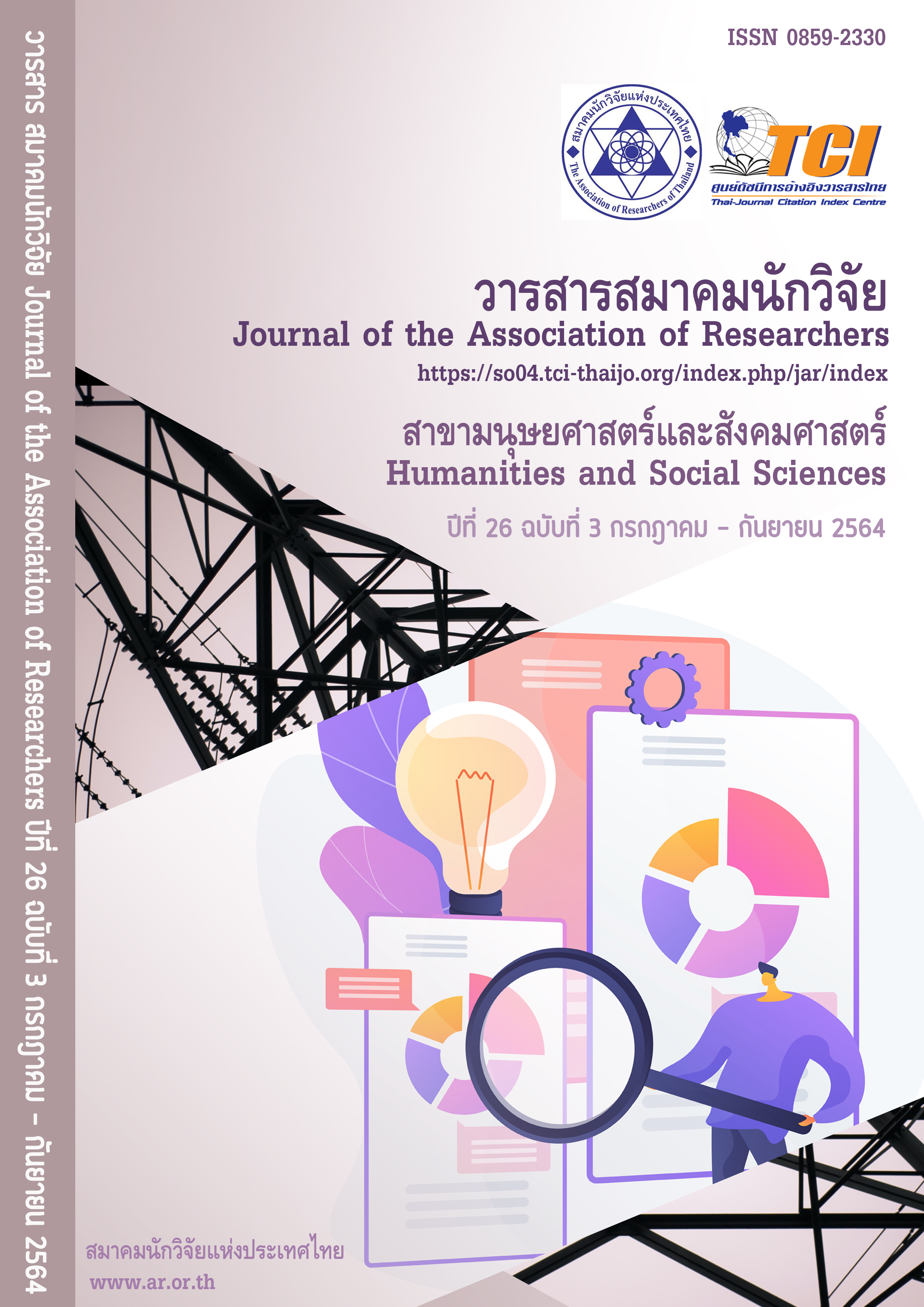Social Innovation for Biodiversity: The United Nations Case Study
Main Article Content
Abstract
Environment and natural resources as well as biodiversity management are fundamentally and characteristically significant and inherently have implications for the human’s way of life, both directly and indirectly. Issues pertaining to conservation and management thereof are considered sensitive, multifaceted, time-consuming, and weighty on budget. The researcher, therefore, wishes to study domestic and international practices of social innovation for biodiversity and the United Nations' approach to the management of social innovation for biodiversity. This study is intrinsical of qualitative nature whereby the data used was collected by in-depth and group interviews including observations. The study result indicates that conceptions and methods that many countries, including Thailand, endeavor to achieve in connection with the conservation of environment and biodiversity are characterized as being in line with conditions and elements of social innovation conducted through a modern form of measure recently called as ‘Biodiversity Finance Plan’. In the case of Thailand, the plausible obstacle is where fiscal policy entails at the macro level. It hinders the effective use of benefits obtained from the biodiversity finance measures. it is also discovered that the local administration has been playing an incredibly vital role, for those working in the system are first-hand practitioners. The stakeholders’ interview sessions were analyzed by the researcher, and four benefits of social innovation for biodiversity were unearthed as follows: 1) It assists the government in lightening its burden of biodiversity management; 2) The management of the country's natural resource is thereby conducted in an effective and swift manner; 3) The government sector ultimately recognizes the problems of management, budget allocation, policy-related impediments, and the creation of cost-effective prototypical model as to the conservation of natural resources and biodiversity; and 4) The private sector is entertained by the opportunity to partake in conserving the environment and biodiversity.
Article Details
บทความที่ปรากฏในวารสารนี้ เป็นความรับผิดชอบของผู้เขียน ซึ่งสมาคมนักวิจัยไม่จำเป็นต้องเห็นด้วยเสมอไป การนำเสนอผลงานวิจัยและบทความในวารสารนี้ไปเผยแพร่สามารถกระทำได้ โดยระบุแหล่งอ้างอิงจาก "วารสารสมาคมนักวิจัย"
References
กรมป่าไม้. (2564). ไม้ท่อนและไม้แปรรูปส่งออก แยกรายประเทศปลายทาง ปี พ.ศ. 2562. สืบค้น 13 มกราคม 2564, จาก http://forestinfo.forest.go.th/Content/file/stat2562/pdf
กฤตินี ณัฏฐวุฒิสิทธิ์. (2563). นวัตกรรมสังคมกุญแจไขความสุขที่ยั่งยืน. สืบค้น 9 มิถุนายน 2563, จาก http://www.prachachat.net/news_detail.php?newsid=1404353549
คณะกรรมการพัฒนาการเศรษฐกิจและสังคมแห่งชาติ. (2546). การพัฒนาที่ยั่งยืนในบริบทไทย. กรุงเทพฯ: สำนักงานสภาพัฒนาการเศรษฐกิจและสังคมแห่งชาติ.
ธนาคารแห่งประเทศไทย. (2564). มูลค่าและปริมาณสินค้าออกจำแนกตามกิจกรรมการผลิต. สืบค้น 12 กุมภาพันธ์ 2564, จาก
https://www.bot.or.th/App/BTWS_STAT/statistics/BOTWEBSTAT.aspx?reportID=747&language=th
ประเวศ วะสี. (2545). เขยื้อนสังคมไทยออกจากโครงสร้างมรณะ. กรุงเทพฯ: สถาบันวิจัยระบบสาธารณสุข.
พระธรรมปิฎก (ป.อ.ปยุตโต). (2539). การพัฒนาที่ยั่งยืน. กรุงเทพฯ: มูลนิธิพุทธธรรม.
พฤทธิ์ ศิริบรรณพิทักษ์. (2551). การจัดการศึกษาเพื่อการพัฒนาที่ยั่งยืน: พื้นฐานการศึกษาด้านเศรษฐกิจ สังคม และสิ่งแวดล้อม. กรุงเทพฯ: คณะครุศาสตร์ จุฬาลงกรณ์มหาวิทยาลัย.
สมพร พวงประทุม (2543). การมีส่วนร่วมในการอนุรักษ์สมุนไพรเพื่อความหลากหลายทางชีวภาพของชาวบ้านในชุมชนท้องถิ่นภาคเหนือ: กรณีศึกษาชุมชนบ้านทุ่งยาว ตำบลศรีบัวบาน อำเภอเมือง จังหวัดลำพูน. เชียงใหม่: มหาวิทยาลัยเชียงใหม่.
วิสุทธิ์ ใบไม้. (2545). มนุษย์กับสมดุลของธรรมชาติ: วิวัฒนาการ มนุษย์ และความหลากหลายทางชีวภาพ. กรุงเทพฯ: ภาควิชาชีววิทยา มหาวิทยาลัยมหิดล.
Bhatt, P., & Altinay, L. How Social Capital Is Leveraged In Social Innovations Under Resource Constraints? (Vol. 51), 2013.
Bund, E., Hubrich, D., Schmitz, B., Mildenberger, G., & Kalev, G. Report on Innovation Metrics – Capturing Theoretical, Conceptual and Operational Insights for the Measurement of Social Innovation. A deliverable of the project: “The Theoretical, Empirical and Policy Foundations for Building Social Innovation in Europe. Paper presented at the European Commission – 7th Framework Programme, Brussels, 2013.
Caulier-Grice, J., Davies, A., Patrick, R., & Norman, W. Defining Social Innovation. The Young Foundation, 2012.
Caulier-Grice, J., Davies, A., Patrick, R., & Norman. Social innovation overview: a deliverable of the project: “The Theoretical, Empirical and Policy Foundations for Building Social Innovation in Europe". Paper presented at the European Commission – 7th Framework Programme, Brussels, 2012.
Murray, R., Caulier-Grice, J., & Mulgan, G. The open book of social innovation. Retrieved from https://youngfoundation.org/wp-content/uploads/2012/10/The-Open-Book-of-Social-Innovationg.pdf, 2010.
Mulgan, G. The Process of Social Innovation. Innovations: Spring, 2006.
Murray, R., Mulgan, G., & Caulier-Grice, J. How to Innovate: The Tools for Social Innovation.
OECD. (2011). Fostering Innovation to Address Social Challenges. Paper presented at the Workshop Proceedings, 2008.
Pagura, S. Pollock, R. and Mussani, S. (2018). Investing In Localism. United Kingdom: Social Finance.
Phills, J., Deiglmeier, K., & Miller, D. T. Rediscovering Social Innovation. In Stanford Social Innovation Review Fall 2008 In. Retrieved from http://www.ssireview.org/images/articles/2008FA_feature_phills_deiglmeier_miller.pdf, 2008.
UNESCO. Educating for a Sustainable Future: A Transdisciplinary Vision for Concerted Action. Paris: UNESCO, 1997.
Translated Thai References
Bank of Thailand. Value and Amount of Goods Categorized by Production Activity. Retrieved 12 February 2021 from https://www.bot.or.th/App/BTWS_STAT/statistics/BOTWEBSTAT.aspx?reportID=747&language=th (in Thai)
Krittinee Natthawutthisit. Social Innovation: A Key to Sustainable Happiness. Retrieved 9 June 2020 from http://www.prachachat.net/news_detail.php?newsid=1404353549 (in Thai)
National Economic and Social Development. (2003). Sustainable Development In Thai Context. Bangkok: Office of the National Economic and Social Development Council. (in Thai)
Phra Dhamma Pidok (Po.Ao.Payutto). (1996). Sustainable Development. Bangkok: Buddha Dhamma Foundation. (in Thai)
Phrut Siribannaphitak. (2008). Education Administration for Sustainable Development: Education Foundation on Economy, Society and Environment. Bangkok: Faculty of Education, Chulalongkorn University. (in Thai)
Prawase Wasi. (2002). Relocation of Thai Society from Fatal Structure. Bangkok: Health Systems Research Institute. (in Thai)
Royal Forest Department. Exported Blocked and Processed Wood Categorized by Destination 2019. Retrieved 13 January 2021 from http://forestinfo.forest.go.th/Content/file/stat2562/Table%2025.pdf (in Thai)
Somporn Phuangprathum. (2000). Participation in Preservation of Herbs for Biodiversity of Northern Local Community: Case Study of Ban Thung Yao Community, Si Bua Ban Subdistrict, Mueang District, Lamphun Province, Chiang Mai: Chiang Mai University. (in Thai)
Wisut Baimai. (2002). Human and Natural Balance: Evolution, Human, and Biodiversity. Bangkok: Department of Biology, Mahidol University. (in Thai)


